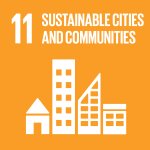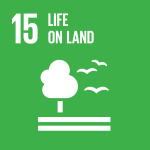
Tzinnia Carranza López, Coordinator of Espacio de Encuentro de las Culturas Originarias, accepting a Local Adaptation Champions Award from the Global Center for Adaptation at COP28 in Dubai.
Local Adaptation Champions Award recognizes how ancestral techniques and community engagement in Mexico are successfully combating the impacts of climate change
December 2023 - Issues such as water scarcity and environmental degradation are harsh realities faced by communities worldwide. In Mexico, however, a successful climate mitigation and adaptation initiative has yielded remarkable results for 15,000 families over the past decade. This initiative, underway in various municipalities in Oaxaca in southern Mexico, has now earned Espacio de Encuentro de las Culturas Originarias a Local Adaptation Champions Award from the Global Center for Adaptation.
Receiving the award at COP28, the organization's coordinator Tzinnia Carranza López said, "This international recognition motivates us to continue identifying vulnerabilities and building local capacities."
This year, the Local Adaptation Champions Award received over 500 proposals globally, featuring candidates from Latin America for the first time. The award aims to acknowledge and incentivize innovative initiatives at the local level to mitigate the impacts of climate change. Winners receive a €15,000 prize.
In 2022, Espacio de Encuentro de las Culturas Originarias also secured a US$60,000 grant from the UNDP-implemented Adaptation Fund Climate Innovation Accelerator (AFCIA). This support enabled the establishment of a research centre for the development and implementation of a technological package involving an integrated system of water channels and fog catchers. In the research centre they evaluate the efficiency of the technological package and refine it in an iterative way.
The solution involves an ancestral technique known as "waru waru," which entails installing water channels between crops to create microclimates that protect against frosts. This technique is complemented by an innovative fog capture method, ensuring a continuous water supply for the channels.
"Our mission is to cultivate local capacities for transferring technology to people and communities, aiming to reduce dependence on external technologies and agents for climate change adaptation. Beyond addressing water scarcity, we confront issues of untreated, contaminated water. We closely monitor crop survival and enhance technology during drought periods," she explains. The organization, under Tzinnia's guidance, conducts thorough assessments to pinpoint the vulnerability of families and identify appropriate technologies.
Oaxaca, with 83 percent of its 570 municipalities at high risk of extreme hydro-meteorological events, is the most vulnerable state in Mexico to climate change. The agriculture and biodiversity sectors, spanning 1,047,585 hectares, face significant threats from drought.
At COP28, the United Nations also bestowed acknowledgment upon young individuals within Tzinnia's team, who were honoured within the Youth category of the UN Global Climate Action Awards.
As well as youth, the organization collaborates with diverse indigenous groups (according to the National Indigenous Institute, in 2012 the indigenous population of Mexico was approximately 15 million people, divided into 68 ethnic groups). “Meetings conducted in indigenous languages underscore the importance of employing individuals from these communities, forming a fundamental aspect of the organization's work. The groups in the field acquire knowledge on implementing the techniques, and we gain valuable insights from their ancestral wisdom,” said Tzinnia.
The initiative also engages with women. "There's a segment of the female population facing severe respiratory issues because of the pervasive smoke within households. By introducing cookers, we reduce wood usage by traditional stoves, mitigating respiratory infections. Additionally, we've incorporated water heaters to address the issue of extremely coldwater during winter, as many women cook with cold hands," said Tzinnia. She stressed that the initiative is a holistic endeavor aimed at collectively addressing the challenges faced by the community.
However, the situation is not as straightforward as it may seem. Tzinnia reflects on the challenges of working within a community, acknowledging that skepticism often arises as people initially believe the introduced technologies may not work or suit their realities. Yet, once they witness the positive outcomes, their interest is piqued. This exchange not only empowers individuals within the community but also establishes a training framework, enabling them to educate others and create a multiplier effect.
"The training of three additional individuals for each person initially trained has proven to be quite impactful. Some individuals are even employed in other communities to implement the technology, thereby generating more job opportunities.”
For more information, please contact Monica Borrero, UNDP-AFCIA Project Manager monica.borrero@undp.org



